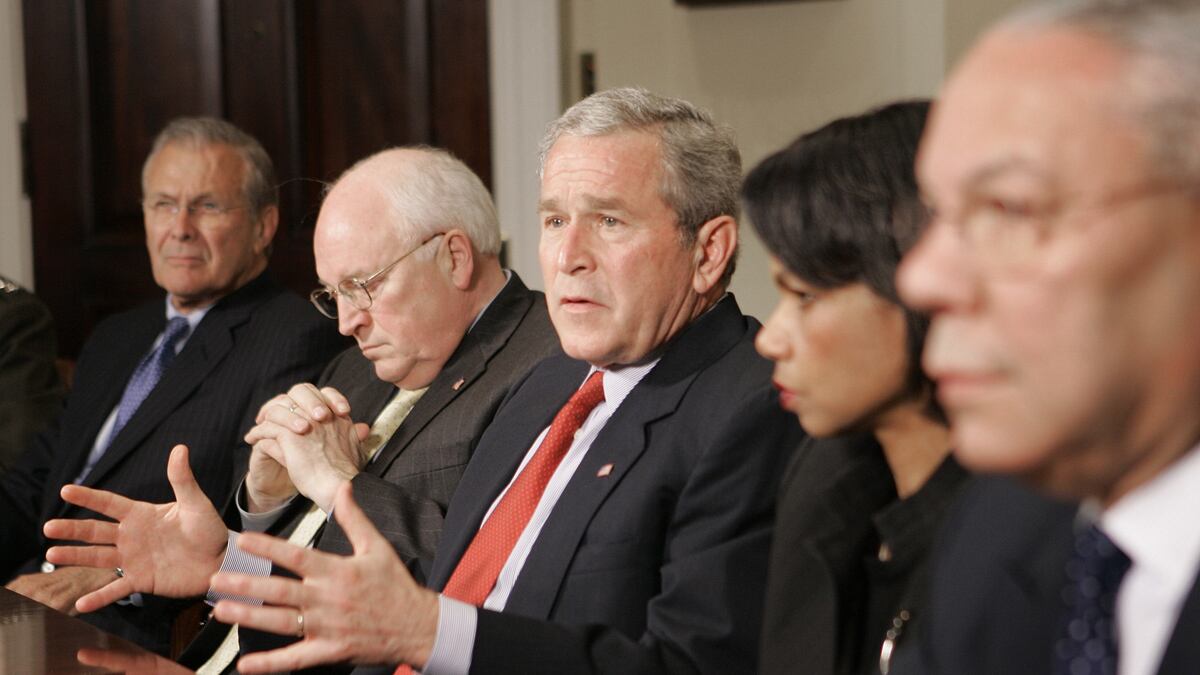Just weeks after the Obama White House closed the book on prosecuting all but two cases related to the Bush administration’s harsh interrogation policies, Human Rights Watch released a sweeping report on Tuesday calling for a criminal investigation into the actions of senior Bush administration officials for allegedly permitting the use of torture, sending suspects to secret CIA prisons, and transferring them to countries where they were tortured by foreign governments, beginning in the early 2000s.
In the report, the human-rights group said the investigation should focus on former president George W. Bush, former vice president Dick Cheney, former defense secretary Donald Rumsfeld, and former CIA director George Tenet. The authors of the report said that former national-security adviser Condoleezza Rice, along with former attorneys general John Ashcroft and Alberto Gonzales and several others, should be investigated as well. “The U.S. government’s pattern of abuse across several countries … resulted from decisions made by senior U.S. officials to bend, ignore, or cast the rules aside,” said Kenneth Roth, the executive director of Human Rights Watch.
Calls made to President Bush on behalf of his administration were not returned for comment.
ADVERTISEMENT

In 2009 President Barack Obama banned the use of waterboarding and other forms of torture and closed the CIA’s secret prisons. He also released a number of top-secret memos by the Bush administration that permitted the use of such techniques. Yet in doing so, the president said it was “time for reflection, not retribution,” and vowed not to prosecute any Bush administration officials for their role in the matter. Months later, Attorney General Eric Holder announced that the investigations into detainee abuse would be limited to incidents that weren’t authorized by the previous administration.
“President Obama has treated torture as an unfortunate policy choice rather than a crime,” said Roth. “His decision to end abusive interrogation practices will remain easily reversible unless the legal prohibition against torture is clearly reestablished.”
The White House did not return a call for comment.
In addition to a broader investigation, the report, which is 107 pages long, calls for “fair and adequate” compensation for those who experienced the government’s so-called enhanced-interrogation techniques, as well as the creation of a nonpartisan commission structured along the lines of the group that investigated the September 11 attacks.
It was in the aftermath of those attacks that the Bush administration authorized the CIA and other agencies to subject terrorism suspects to waterboarding, slapping, and sleep deprivation, among other techniques, all of which the government had previously condemned, in an effort to capture and kill Osama bin Laden and his Al Qaeda network. These methods were reportedly reinstated as a part of a program that was based not on any actual interrogations, according to analysts, but rather on mock torture sessions devised to help train U.S. soldiers to resist revealing classified information or producing propaganda in response to torture techniques like those employed by the Chinese communists in previous decades.
“It was not a professional interrogation program,” said Steve Kleinman, a career military intelligence officer who served as an interrogator for the Defense Department.
Rather than getting prisoners to talk, these techniques often proved ineffective and counterproductive, according to Kleinman and other former interrogators.
“It doesn’t work, and I know it doesn’t work because I was involved in this stuff,” said Glenn Carle, a former CIA officer and author of The Interrogator, a memoir released several weeks ago, about the time he spent questioning high-level suspects at the CIA’s secret prisons.
Nevertheless, some former Bush administration officials have long maintained that harsh interrogation techniques are essential for fighting terrorism. Indeed, after the Navy SEALs successfully killed bin Laden in his secret compound in Pakistan, some said that the CIA’s decision to subject 9/11 architect Khalid Sheikh Mohammed to waterboarding more than 180 times helped track down bin Laden.
These claims are absolutely false, according to former interrogators such as Carle and Kleinman. And from the get-go, critics—including former FBI director Robert Mueller—expressed their strong concerns about the moral and legal ramifications of the Bush administration’s policies.
Yet Bush administration officials also maintained that Common Article 3 of the Geneva Conventions, an international agreement that governs the treatment of prisoners of war, did not apply to members of Al Qaeda or the Taliban.
In 2006 the Supreme Court ruled otherwise, but it wasn’t until Obama took office that the interrogation policies of the Bush administration were put to rest.
In issuing the report, Human Rights Watch is hoping to pressure the current White House into taking another look at the legality of the policies of the previous administration.
“Obama has been pretty clear on banning torture,” said Laura Pitter, a counterterrorism adviser to Human Rights Watch. “But from our perspective, it makes it very difficult for the U.S. to argue for the rule of law and human rights in other countries if we’re not doing the same at home.”
Some analysts such as Kleinman championed the report, yet were pessimistic about its impact.
“I’ll actually be quite shocked if anyone takes any action, which is unfortunate,” he said.
Others, however, agreed with the Obama administration’s decision to avoid prosecutions.
“Prosecutions will divide us and not make these excesses less likely,” said Carle.
Yet both Kleinman and Carle agreed that the report was correct in its basic assessment that torture could eventually return as common practice in the United States.
Indeed, newly appointed CIA Director David Petraeus—who once clearly denounced torture—appeared to offer some ambiguity on the matter several weeks ago in explaining a hypothetical incident in which interrogators question a suspect who may know of an imminent attack.
“The whole ticking-time-bomb thesis is … so cockamamie,” said Carle. “You don’t build your laws on things that are 10 deviations from the norm.”






